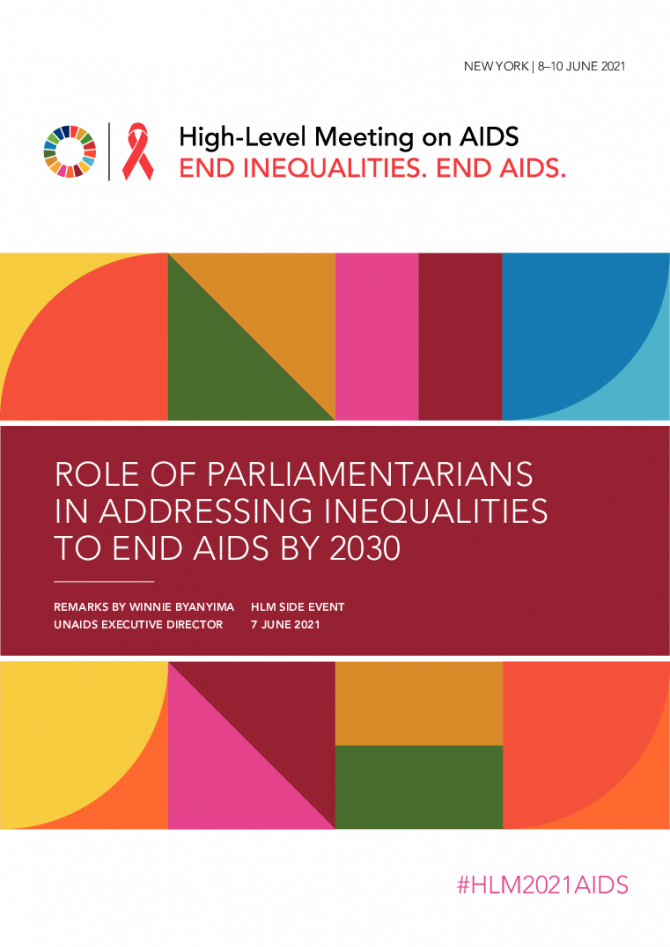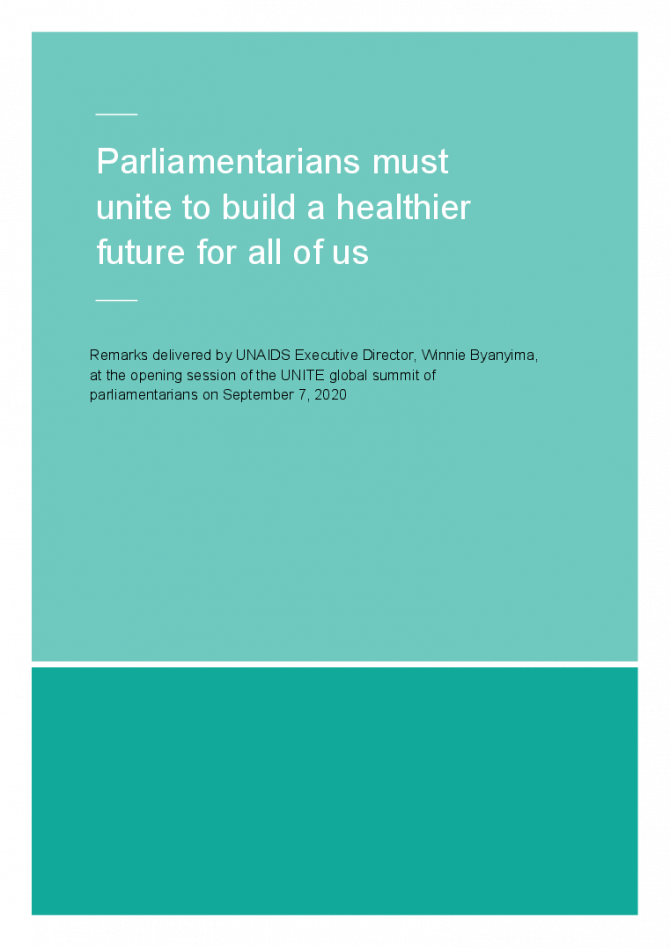
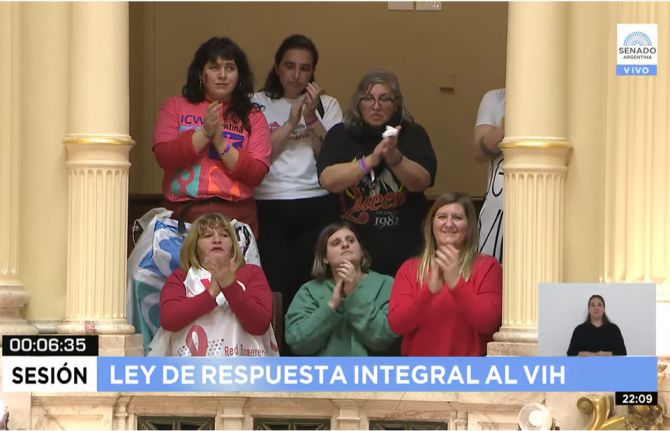
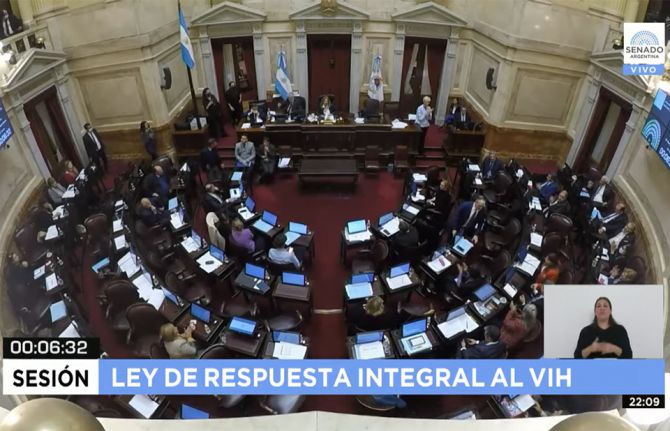

Press Statement
UNAIDS applauds Argentina for the approval of its new human rights-based HIV law
04 July 2022 04 July 20224 July 2022—UNAIDS congratulates the Argentinian Congress on the approval of a new law on a comprehensive response to HIV, viral hepatitis, tuberculosis and sexually transmitted infections (STIs). The bill, which has had input from a number of civil society organizations, replaces 30-year-old legislation and changes the country’s health approach from a biomedical approach to an approach more focused on gender and human rights. The new law calls for an end to stigma and discrimination against people living with HIV or STIs and aims to stop criminalization of HIV exposure or transmission.
By prohibiting mandatory testing for HIV and other STIs as part of pre-employment exams, the new law also seeks to protect against discrimination in all areas (with emphasis on the workplace) and ensures the privacy of the diagnosis.
“We join the civil society and community movements in this important celebration. The new law is evidence-based and written from the perspective of human rights,” celebrates Alberto Stella, UNAIDS Country Director for Argentina, Chile, Paraguay and Uruguay. “The HIV response in the country now counts on a broad framework of social protection, very much in line with the Global AIDS Strategy (2021-2026), which focuses on ending inequalities to end the AIDS epidemic.”
Besides eradicating discriminatory practices, the new legislation also includes the possibility of early retirement at 50 years old for people who have been living with the virus for ten years and who have paid at least 20 years of pension contributions. It also allows access to a non-contributory pension for life in cases of social vulnerability.
The new bill pays a historical debt for dozens of activists who occupied the balconies of Congress in recent voting sessions and the thousands of people living with HIV they represent. “We are one step closer to eliminating barriers to the implementation of self-testing and promoting prevention strategies such as Pre-Exposure Prophylaxis (PrEP)”, celebrated Fundación Huesped, an Argentinian organization with a regional reach that has advocated for the right to health since 1989.
The new law also recognizes specific rights of women, guarantees the right to health of their children and ensures compliance with the rights recognized in the law for the Integral Protection of Women.
“This is the result of the articulated work conducted by civil society who not only led its elaboration but who also did excellent and hard work on advocacy,” says Stella. “Along with the National HIV, TB, Hepatitis and STI department of the Ministry of Health, UNAIDS was able to contribute with advocacy efforts and the facilitation of dialogues, providing evidence and the informing on international guidelines.”
The new bill also proposes the national production of medication and supplies.
The latest estimates from the UNAIDS 2021 Global AIDS Update report show that 140 000 people are living with HIV in Argentina and 65% of whom are on antiretroviral treatment. Every year 5600 people are newly infected with HIV, and 1400 people die from AIDS-related illnesses.
UNAIDS
The Joint United Nations Programme on HIV/AIDS (UNAIDS) leads and inspires the world to achieve its shared vision of zero new HIV infections, zero discrimination and zero AIDS-related deaths. UNAIDS unites the efforts of 11 UN organizations—UNHCR, UNICEF, WFP, UNDP, UNFPA, UNODC, UN Women, ILO, UNESCO, WHO and the World Bank—and works closely with global and national partners towards ending the AIDS epidemic by 2030 as part of the Sustainable Development Goals. Learn more at unaids.org and connect with us on Facebook, Twitter, Instagram and YouTube.
Region/country

Feature Story
United Kingdom parliamentary group visits UNAIDS to strengthen collaboration
06 April 2022
06 April 2022 06 April 2022Members of the All-Party Parliamentary Group (APPG) on HIV and AIDS from the United Kingdom, along with the Director of Stop AIDS, visited UNAIDS Headquarters in Geneva, Switzerland, to strengthen collaboration.
Since the mid-1980s, APPG has brought United Kingdom parliamentarians together from across the political divide to fight for the rights of people living with HIV.
“I think all politicians are driven by wanting to make a difference,” said David Mundell, Member of Parliament, who is Co-Chair of APPG. “This is an established all-party group that has been effective, with a voice in parliament and that also acts globally.”
Mr Mundell said that APPG is focused on maintaining momentum on HIV in the face of several challenges. Not only did some people in the United Kingdom mistakenly imagine that HIV was already sorted, he said, he also alluded to the challenges in keeping attention on HIV given the war in Ukraine and the ongoing COVID-19 pandemic.
“We have to be advocates for change in terms of keeping HIV high on the agenda and resources available,” he said. For example, he believes that funds for Ukraine should be additional and not come from the international development envelope and will argue that case to the United Kingdom’s Foreign Secretary.
In his words, it’s all about putting the best case forward. “There is a competition for attention, therefore we need to put issues into context,” Mr Mundell said. He mentioned UNAIDS and its Cosponsors’ Education Plus initiative as a great way to empower young women while also tackling HIV. “Demonstrating the interconnectedness of such issues will allow us to sustain our arguments.” Every week, more than 4200 young women become infected with HIV in sub-Saharan Africa but keeping girls in secondary school reduces that risk by up to 50%.
Reflecting on the United Kingdom’s decision to cut its level of official development assistance from 0.7% to 0.5% of gross domestic product and reduce funding for the AIDS response, Mr Mundell explained that there have been many ongoing changes in the United Kingdom, but he is confident in making the case that investment in the AIDS response is good value. “It is quite clear that United Kingdom funding will be more outcome-based, with a need to show direct results based on investment. APPG intends to maintain United Kingdom leadership in the AIDS response, working with community groups on the ground with the Global Fund to Fight AIDS, Tuberculosis and Malaria, as well as UNAIDS.”
UNAIDS and APPG reiterated their strong commitment to having a fully replenished Global Fund. Twenty years after the founding of the Global Fund, the target for the seventh replenishment is to raise US$ 18 billion to save 20 million lives. According to estimates, this represents 14% of the total of US$ 130.2 billion needed for the period 2024–2026.
Inter-Parliamentary Union Secretary-General Martin Chungong and UNAIDS Executive Director Winnie Byanyima hosted a joint round table for APPG to discuss the crucial role of legislators worldwide in taking the bold actions needed to end AIDS.
“We parliamentarians from the United Kingdom cannot tell people in other countries how to run their country, that is not what we want to do,” said Mr Mundell, noting that instead the group worked to share experiences and build partnerships. He cited how criminalization has been linked to higher numbers of HIV infections, which can often lead to much more difficult, long-term consequences. “By highlighting certain practices and steps we want to show that certain changes can have a positive effect without undermining cultural values,” he said.
Mr Mundell noted that during the Commonwealth discussions in mid-March, he urged all nations to have full and frank discussions on progress in advancing the rights of lesbian, gay, bisexual, transgender and intersex people and progress in ending AIDS, saying that a huge amount had been achieved but that there was still a lot to do.
Suki Beavers, UNAIDS Director, Gender Equality, Human Rights and Community Engagement, commended APPG’s inclusive approach. She also stressed that the role of parliamentarians is key.
“Parliamentarians can open up the space to discussions and make diverse voices heard in the national policy process, especially the voices of people who are often excluded from decision-making on the issues that affect them most,” she said. Ms Beavers also said that strengthening peer-to-peer relations (parliamentarian to parliamentarian) can also drive progressive law reform.
Mr Chungong shared how parliamentarians from across the world are stepping up their work with UNAIDS to address the inequalities that hold back progress on ending AIDS.
In Ms Beavers’ closing remarks, she reiterated to the group the fact that the HIV response was at a critical point. “We need to move to a more targeted and systemic approach as laid out in the new Global AIDS Strategy 2021–2026, including fully funded and supported community-led responses,” she said.
“It is really clear that we need major leverage to influence and to create more and more diverse partnerships so that we can achieve the goal of ending AIDS as a public health threat by 2030.”
Region/country
Related

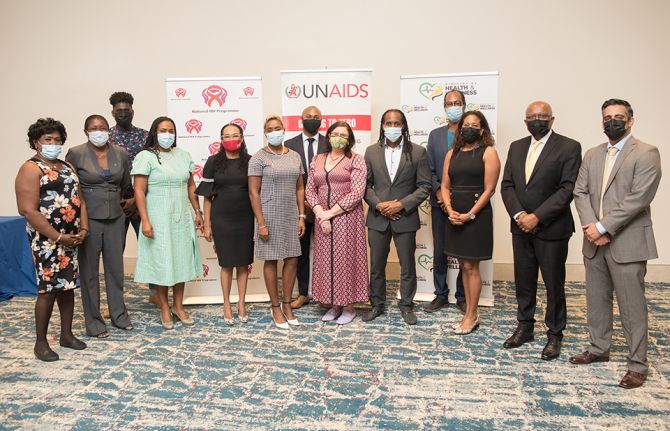
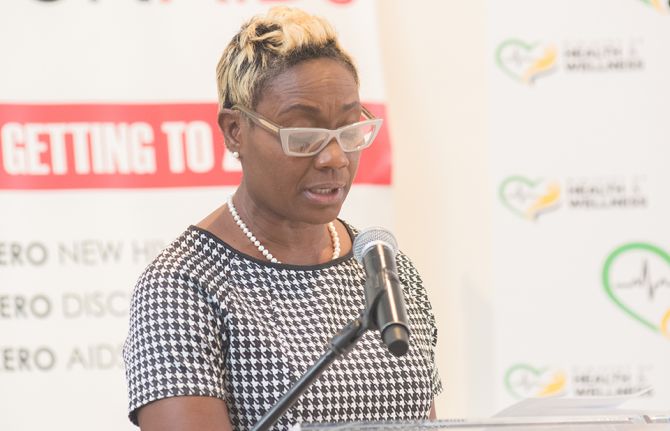
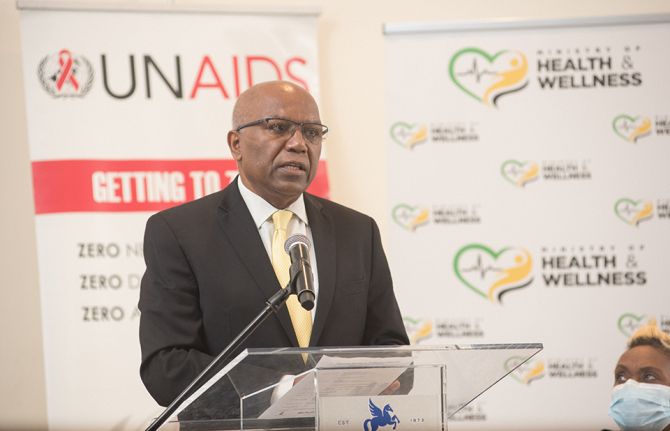
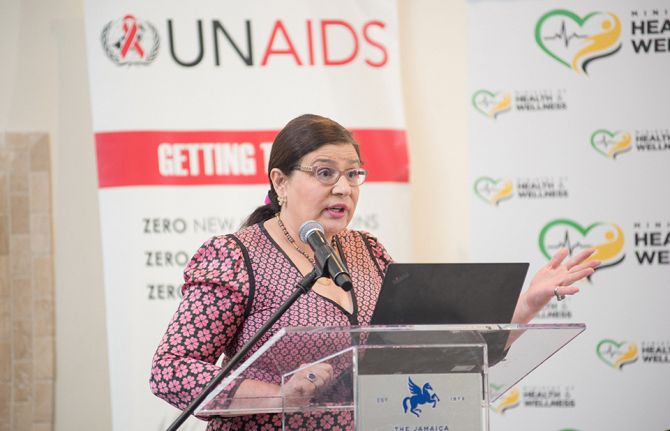
Feature Story
Jamaican parliamentarians committed to ending discrimination
25 November 2021
25 November 2021 25 November 2021Members of parliament have reaffirmed their commitment to tackle all forms of HIV-related stigma and discrimination in Jamaica and to help enhance efforts to create an enabling environment for people living with and affected by HIV.
At a meeting co-hosted by UNAIDS and Juliet Cuthbert-Flynn, the Minister of State for Health and Wellness and Chair of the country’s Partnership for Action to Eliminate all Forms of HIV-Related Stigma and Discrimination, members of parliament, from both the ruling and opposition parties, came together to review evidence on stigma and discrimination in Jamaica and its impact on health outcomes and to craft a way forward in which their role as lawmakers can contribute to eliminating stigma, discrimination and violence.
Jamaica’s legal landscape poses substantial barriers for people living with and affected by HIV to access health services. For example, same-sex sexual relations are criminalized in Jamaica, which continues to represent a considerable deterrent for marginalized communities. Moreover, the country lacks general legislation against discrimination, a national human rights institute and a gender recognition law that could provide further protection for transgender and gender non-conforming people in Jamaica.
Harmful laws, policies and generalized stigma and discrimination against people living with and affected by HIV have a profound negative effect on people’s health outcomes and life prospects. The most recent Knowledge, Attitudes, Practices and Behaviour Survey and the People Living with HIV Stigma Index showed that only approximately 12% of the general population have accepting attitudes towards people living with HIV, while close to 60% of people living with HIV have feelings of self-stigma. A 2019 study about the economic survivability of transgender and gender non-conforming communities in Jamaica found that experiences of workplace stigma and discrimination were widespread, with about 60% of survey respondents declaring such incidents. Furthermore, 71% of respondents felt that transgender and gender non-conforming people had a harder time getting jobs than cisgender people. Another study suggests that approximately 20% of lesbian, gay, bisexual and transgender people in Jamaica have been homeless at some point of their lives.
In view of these pending challenges in the country’s HIV and human rights response, members of parliament explored creating a working group tasked with performing periodic reviews of relevant data, supporting the enactment of protective legislation, challenging harmful laws and policies and hosting permanent dialogues with communities of people living with and affected by HIV.
“We have a lot of work to do to ensure that all Jamaicans enjoy the full respect, protection and promotion of their rights. This meeting and its outcomes are a small step to achieving that goal, but a step that certainly is pointing us to the right direction on the role that members of parliament should play to end discrimination,” said Ms Cuthbert-Flynn.
These efforts, which aim to tackle deeply rooted misconceptions in society, require strong partnerships. As stated by Morais Guy, the Opposition Spokesperson on Health, who co-chaired the meeting, “The enhancement of people’s rights and collective efforts to ensure that every Jamaican can live a life free from stigma, discrimination and violence is not an issue of only one person, one entity or one political party. It is the business of all of us, to work in partnership for the dignity of all Jamaicans.”
Members of parliament also discussed some of the challenges that they face as legislators to perform their duties, and the contributions that UNAIDS can make in facilitating a more efficient, effective and transparent law-making process in parliament. Moreover, options to mobilize and engage citizens at the community level to challenge stigma were also discussed in response to the critical need of raising more awareness, tolerance and respect towards people living with and affected by HIV.
“We are proud to partner with members of parliament to tackle stigma and discrimination in Jamaica and to provide all of the evidence, instruments and support that we can mobilize to leverage their role as allies and critical influencers in the future of the country,” said Manoela Manova, the UNAIDS Country Director for Jamaica.
Region/country
Related

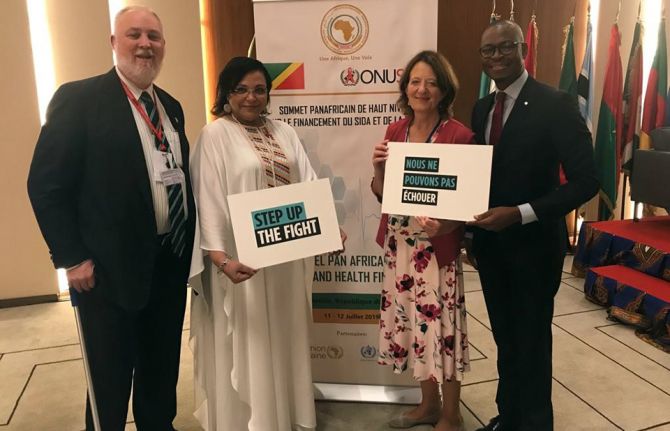
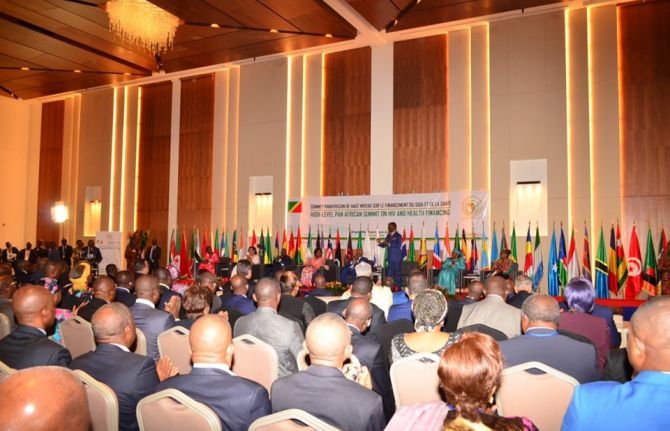
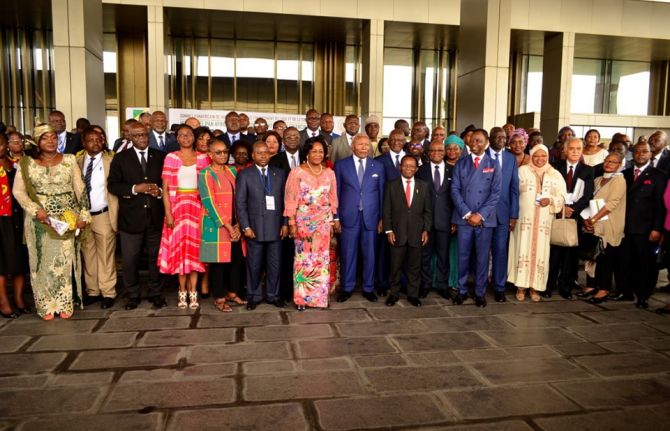
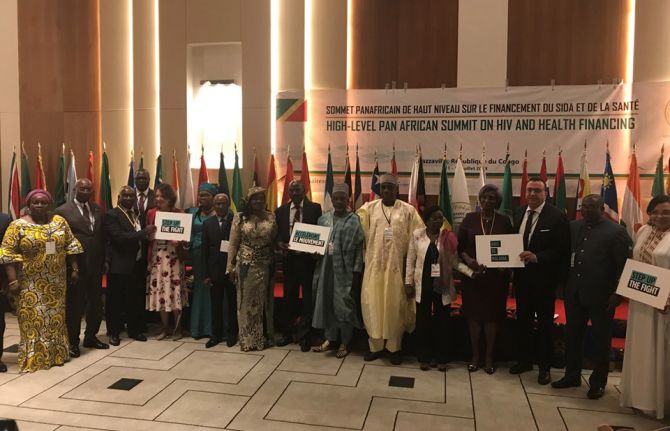
Feature Story
Pan-African Parliament calls for increased domestic resources for HIV and health in Africa
15 July 2019
15 July 2019 15 July 2019A communiqué adopted at the High-Level Pan African Summit on HIV and Health Financing has called for parliamentarians to ensure the right to health for all and for stronger advocacy to increase domestic resources for HIV and health.
“There is an urgent need for our governments to mobilize domestic resources to ensure sustainable and affordable access to HIV treatment, for all, to ensure that all women have the same chances as I did to raise HIV-free and healthy children,” said Valerie Maba, President of the national network of HIV-positive organizations of the Congo.
Roger Nkodo Dang, the President of the Pan-African Parliament, highlighted the urgency of finding durable sources of financing to respond to HIV and to improve public health services in Africa.
Significant increases in both domestic and international funding have enabled African countries to rapidly expand their HIV programmes in recent years. In 2018, 16.3 million people living with HIV were on antiretroviral therapy in sub-Saharan Africa, representing 70% of the total number of people on antiretroviral therapy globally. At the end of 2017, about US$ 21.3 billion was available for HIV programmes in sub-Saharan Africa, with domestic investments accounting for approximately 56% of total resources.
Countries were also encouraged in the communiqué to further contribute to global solidarity in the upcoming replenishment of the Global Fund to Fight AIDS, Tuberculosis and Malaria. “Today, we are honoured to be among you and we salute the efforts of 11 African member states that have already stepped up and pledged,” said Marijke Wijnroks, Chief of Staff of the Global Fund.
In 2001, the heads of state of the African Union committed, through the Abuja Declaration, to allocate at least 15% of national budgets to health care in order to achieve universal health coverage. However, the share of expenditure allocated to health in national budgets in Africa has in fact decreased, and in 2018 there was a gap of US$ 5 billion for the AIDS response, and only two out of 55 African Union member states complied with the Abuja Declaration targets.
In February 2019, African Union member states reiterated their commitment to increase domestic resources for health on the sidelines of the 32nd Ordinary Session of the Assembly of Heads of State and Government through the Declaration of the Investing in Health Africa Leadership Meeting.
“Ending AIDS by 2030 is a Sustainable Development Goal and an aspiration of Agenda 2063. Controlling the epidemic is a prerequisite for sustainable results. If our governments do not Fast-Track and ensure the financial sustainability of the response, the socioeconomic and human burdens will get worse,” said Clémence Bare, Director of the UNAIDS Liaison Office to the African Union.
Held under the auspices of Denis Sassou Nguesso, the President of the Congo, and convened by UNAIDS, the Pan-African Parliament and the Regional Office for Africa of the World Health Organization, the summit was held in Brazzaville, Congo, on 11 and 12 July.
Related

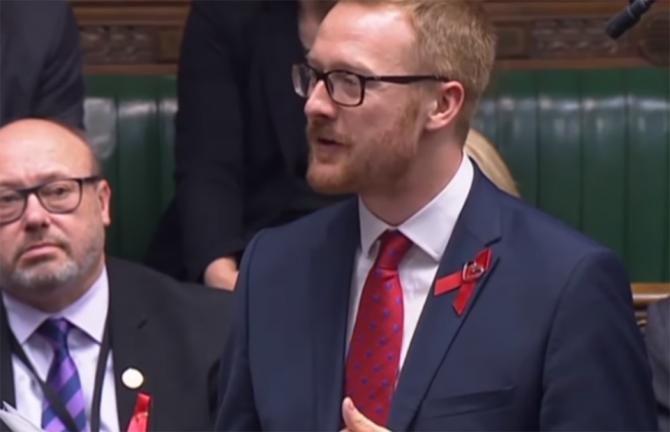
Feature Story
Stigma makes HIV life-threatening
25 February 2019
25 February 2019 25 February 2019“If I am meant to be a leader, I needed to be truthful,” said Lloyd Russell-Moyle, British Member of Parliament, reflecting on his bold move to reveal his HIV-positive status in the House of Commons in late November 2018, days before World AIDS Day.
He explained that for years he would honour people for their outstanding work in the HIV field and yet he never opened up and was honest with people about living with HIV.
“The more people don’t talk about it, the harder it is for everyone. As a Member of Parliament my job involves speaking out, being an advocate and helping people in their journey,” Mr Russell-Moyle said.
In his speech to the House of Commons, he described the sense of fear he had when he learned that he was living with HIV nearly 10 years ago. In his view, there is internal stigma, which kept him from speaking about his status for fear of “spreading” what used to be a deadly disease and the fear that people may reject him if they knew he was living with HIV.
“All that stigma makes a treatable disease life-threatening due to the impact on an individual’s mental health and access to medication,” he said in his emotional 28 November speech. In a telephone interview with UNAIDS, he specified that, “In no way should we glorify HIV, but it is liveable and manageable.” And living with HIV should not hold anyone back in any way, shape or form, he stated.
He desperately wants people to understand HIV better. “I want to get to the stage where I don’t have to explain that if you take one pill a day, you [have a viral load that is] undetectable and if you become undetectable you cannot pass the virus on to anyone,” he said.
That’s why, with the leading British association representing professionals in HIV care, BHIVA, Mr Russell-Moyle wants to reform certain laws. One European Union law forbids people living with HIV from obtaining a full pilot licence.
“It’s outdated considering that HIV treatment now involves a pill a day with no side-effects,” he said.
He also has been vocal about the British Government’s public health spending cuts. “We are at a crossroads right now, having made so much progress,” Mr Russell-Moyle said. “We are in danger of lifting our foot off the pedal so close to the finish line.”
Not funding vaccine research and reducing sexual health screening and prevention will cost the government in the long run and ruin lives, he predicted. “It’s a race against the disease, and if we slow down at this stage we will likely see a rebound,” he said.
According to Public Health England, 12% of people living with HIV in England are unaware of their diagnosis. A Brighton-based foundation launched a Making HIV History campaign to improve knowledge and encourage people to come forward for testing—Mr Russell-Moyle noted that the Stigmasaurus video animations were a great tool to correct stereotypes.
“We have got the drugs, the tools to allow everyone to live happily, so for those who don’t know their status: get tested, get treatment, it will be okay.” He concluded, “It is okay.”
Region/country

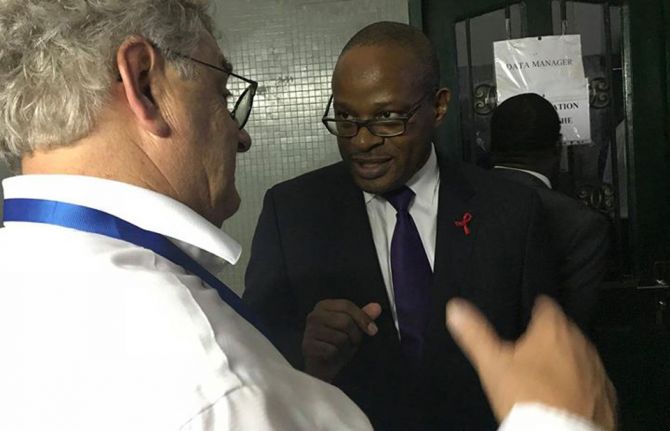
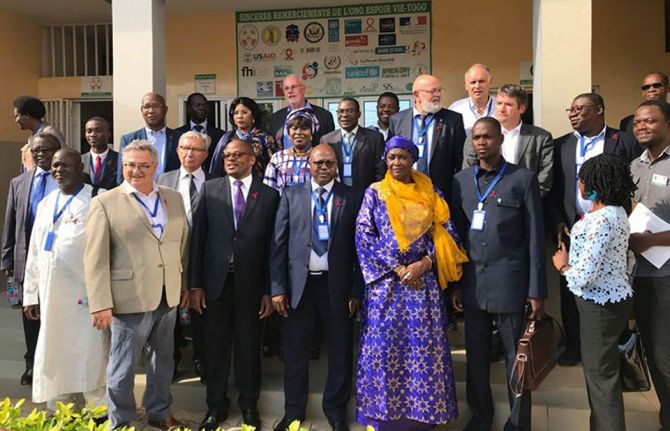
Feature Story
Francophone parliamentary network reiterates its commitment to respond to AIDS, tuberculosis and malaria
12 October 2018
12 October 2018 12 October 2018The Parliamentary Network to Fight AIDS, Tuberculosis and Malaria reaffirmed its commitment to increase funding to end the three diseases at its annual meeting in Lomé, Togo, held on 4 and 5 October. The network committed to urge the heads of state and government of the Francophonie to advocate for increased funding during the sixth replenishment conference of the Global Fund to Fight AIDS, Tuberculosis and Malaria, which will be held in Lyon, France, in October 2019.
“UNAIDS recognizes the important initiatives of French-speaking parliamentarians at both the national and international levels, as well as the advocacy and efforts of the Parliamentary Network to Fight AIDS, Tuberculosis and Malaria,” said Christian Mouala, UNAIDS Country Director for Togo.
The network, which is affiliated to the Parliamentary Assembly of the Organisation internationale de la Francophonie, also agreed that it will focus on the reform of punitive laws that perpetuate HIV- and tuberculosis-related stigma and discrimination.
“The responses to AIDS, tuberculosis and malaria require the commitment of all: national ministries of health, researchers, funders and, of course, parliamentarians. Only by pooling our efforts and with the strength of our parliaments and our members can we hope to, one day, overcome these epidemics,” said Didier Berberat, President of the Network to Fight AIDS, Tuberculosis and Malaria and Councillor for States, Switzerland.
UNAIDS has a cooperation agreement with the Parliamentary Assembly of the Organisation internationale de la Francophonie, which is due to be renegotiated this year.
Region/country

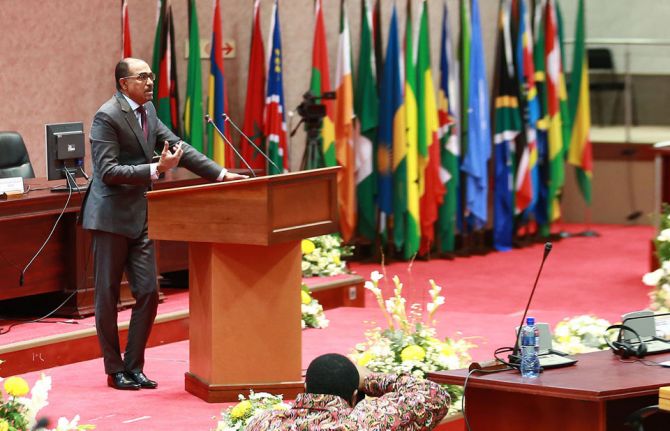
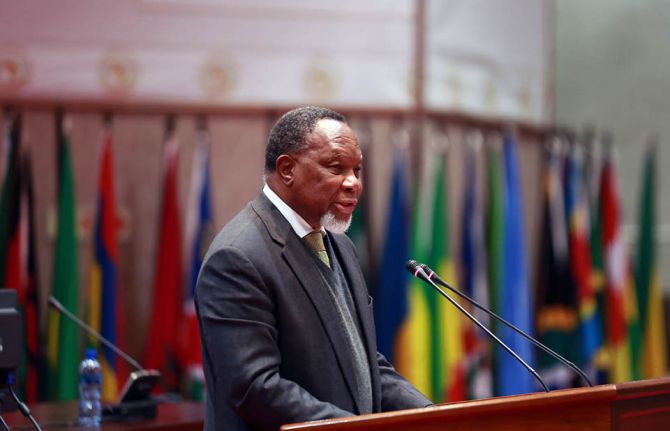
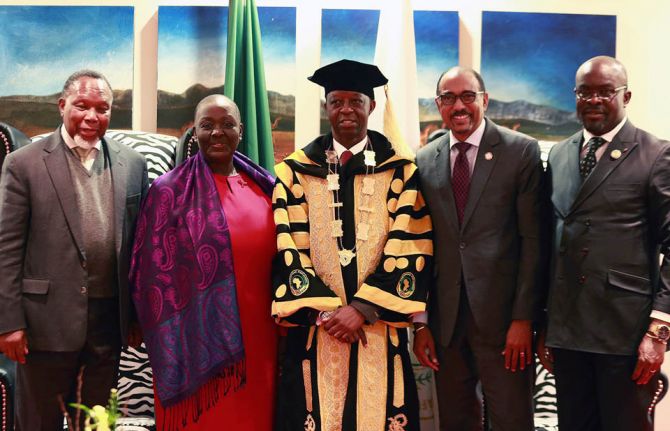
Feature Story
African parliamentarians consider historic resolution on advancing the right to health
14 May 2018
14 May 2018 14 May 2018Parliamentarians from across Africa are considering a historic resolution to promote the right to health and achieve targets on HIV, tuberculosis, malaria and other health emergencies, such as cervical cancer and hepatitis.
Michel Sidibé, the UNAIDS Executive Director, addressed the Pan African Parliament on 9 May to urge its members to express their firm commitment and determination to end the AIDS epidemic and deliver on the Abuja Declaration and the plan of action on achieving health targets in Africa. The plan of action resulted from a high-level parliamentary meeting convened in October 2017 by UNAIDS in partnership with the Pan African Parliament and the African Union.
“A Pan African Parliament resolution will help to achieve health targets in Africa. Parliamentarians, as champions in their communities, can help achieve these targets,” said Mr Sidibé.
The final decision of the parliament will be confirmed after the sixth ordinary session of the fourth parliament concludes on 18 May. The resolution will be the first of its kind for the Pan African Parliament since it commenced in 2004.
“AIDS is not over. We need to reach everyone who does not yet know that they are HIV-positive,” said Kgalema Motlanthe, former President of South Africa.
Related

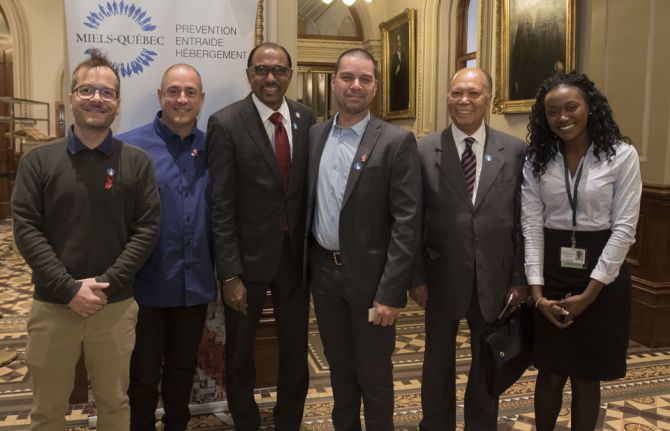
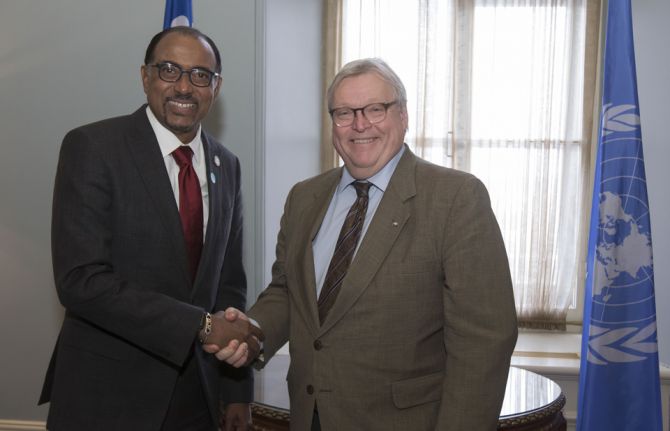
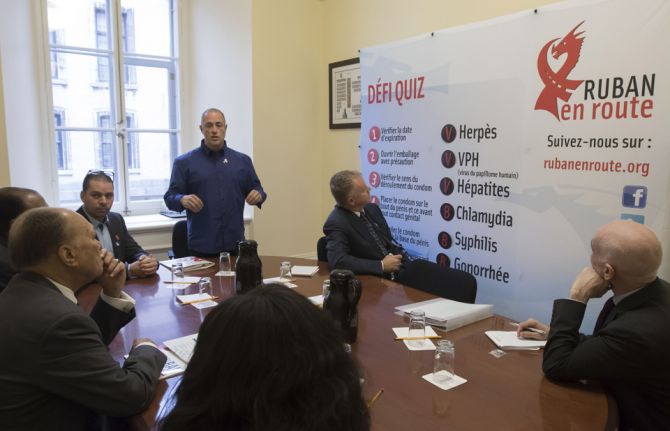
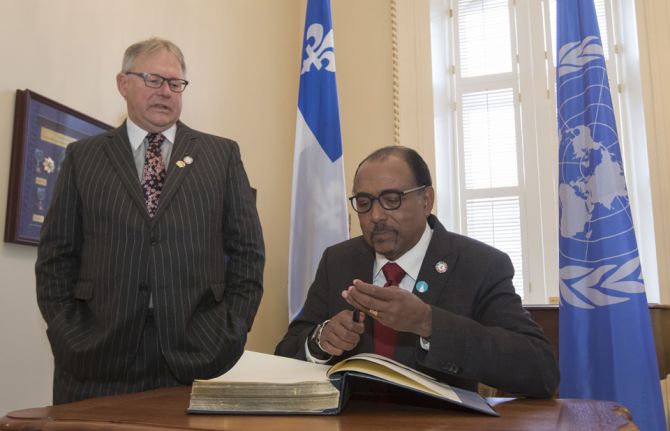
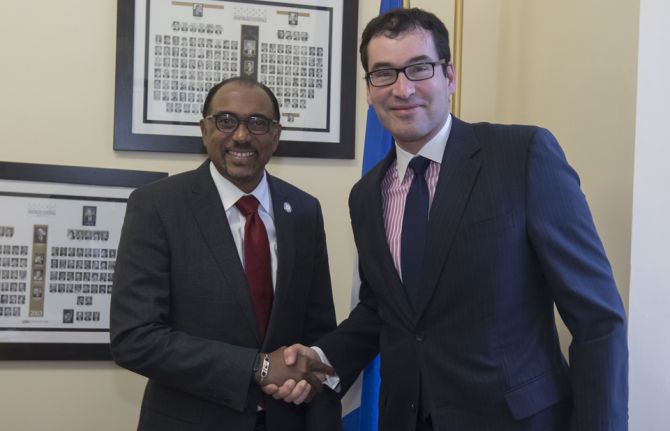
Update
Quebec parliamentarians and civil society both vital to the AIDS response
29 November 2017
29 November 2017 29 November 2017During a visit to Canada, on 28 November UNAIDS Executive Director Michel Sidibé met with members of the Government of Quebec, members of parliament and civil society at the National Assembly of Quebec.
In meetings with the Quebec Minister of Health, Gaétan Barrette, and the Deputy Minister for International Relations and the Francophonie, Jean-Stéphane Bernard, Mr Sidibé underlined that it is important that UNAIDS’ work be aligned with that of the Quebec Government and stressed the need to tailor the response to HIV in accordance with the needs of the country or region. He also spoke about the urgent need to make HIV prevention more effective and the importance of investing in HIV prevention and reducing the number of new HIV infections.
Mr Sidibé also discussed Quebec’s AIDS response and visited Point de Repères, a community-based organization that advocates for harm reduction. He met with leaders from MIELS-Québec, a community-based organization working for more than 30 years with people living with HIV, and Ruban en Route, a not-for-profit organization providing prevention education programmes designed to reduce sexual risk behaviours.
During meetings with members of Quebec’s Parliament, including with Jacques Chagnon, President of the National Assembly and President of the Parliamentary Assembly of La Francophonie, Mr Sidibé emphasized the important role that parliamentarians play in the global response to HIV. He also stressed that parliamentarians are critical to advancing the vision of ending AIDS by 2030 through their leadership, advocacy role and ability to authorize and oversee spending on AIDS.
Quotes
“The National Assembly of Quebec is a vital ally for social justice and to guarantee the right to health for all. Together we can end the AIDS epidemic by 2030.”
“The National Assembly of Quebec is pleased to contribute, to the best of its ability, to the exchange of information and experiences on best practices in the response to HIV through the Parliamentary Network for the Fight Against HIV/AIDS, which was created by the Parliamentary Assembly of La Francophonie.”
“In the framework of the 90–90–90 targets, Quebec has mobilized and made a lot of effort. Although the last percentages are the most difficult to reach, we are on the right track. We can count on invaluable partners in this regard, particularly from community organizations, as demonstrated by our recent collaboration in the implementation of supervised injection sites in Montreal.”







